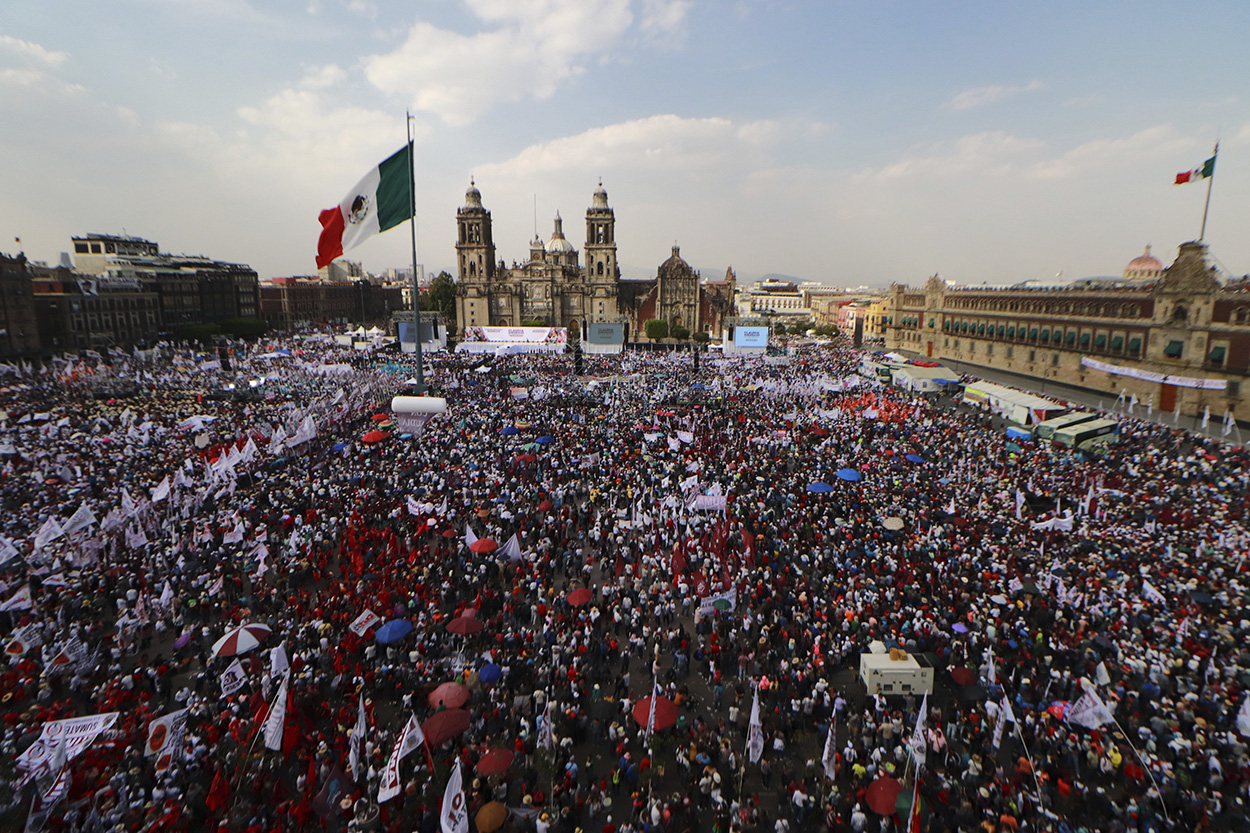Mexico and U.S. Remove Roadblocks for NAFTA Trucking Provisions
Mexico and U.S. Remove Roadblocks for NAFTA Trucking Provisions
After approving NAFTA in 1994, the United States continued to restrict Mexican truckers’ ability to cross the border. A bilateral agreement signed July 6 seeks to put the dispute to rest.
Seventeen years after signing the North American Free Trade Agreement, the United States and Mexico took steps to ease international trucking restrictions. Both countries’ transportation departments signed an agreement Wednesday to allow commercial truckers to cross into each other’s territory beyond the 25-mile border zone and return with cargo, though the agreement does not permit foreign-based truckers to carry either country’s domestic loads. To address U.S. lawmakers’ safety concerns, Mexican trucks must comply with post-1998 Environmental Protection Agency standards and drivers must demonstrate knowledge of English, understanding of U.S. road rules, and submit to alcohol and drug tests. Carriers that successfully complete 18 months in the pilot program will receive permanent permission to operate in the United States. In exchange, the Mexican government will phase out $2.4 billion in retaliatory tariffs levied against U.S. goods for the last two years. “The agreements signed are a win for roadway safety and they are a win for trade,” U.S. Transportation Secretary Ray Hood said in a press release Wednesday.
The agreement is a step toward resolving a longstanding commercial dispute. The United States and Mexico agreed to eliminate restrictions on trucking across the border when they signed NAFTA in 1994, but the United States backed out of that part of the agreement the following year, citing safety concerns. The Mexican government won the dispute before a NAFTA arbitration panel, giving Mexico the right to slap retaliatory tariffs on U.S. imports. But the administrations of President Felipe Calderón and his predecessor Vicente Fox held off, hoping to negotiate their way out of the impasse. The Mexican government got its wish in 2007, when the White House inaugurated a pilot program to allow Mexican truckers into the United States. Safety concerns proved largely unfounded, as Mexican long-haul trucks crossed into the United States 46,000 times under the program without significant incident, according to The Houston Chronicle. But when the U.S. Congress eliminated funding for the program in 2009, the Mexican government finally hit 89 U.S. imports, ranging from fresh dates to washing machines, with tariffs running between 5 and 25 percent.
After signing Wednesday’s agreement, the Mexican government said it would eliminate half of the tariffs by July 8 and the other half within five days of the date that the United States issues the first Mexican license to cross the border. The Secretariat of Transportation warned, however, that it reserved the right to reinstate the tariffs in the future if the U.S. government again decided to restrict Mexican truckers from entering the country.
Supporters cheered the agreement, which promises to reduce cross-border transportation costs. Most goods currently move across the border in three stages, as the sending country drops the goods off to specialized cargo trucks at the border zone, which carries them to the other side to be picked up another truck. The burden adds some $400,000 million annually in transactional costs, according to U.S. government data cited by the American Trucking Association (ATA).
Not everyone is happy about the deal. Two Democratic congressmen and one Republic teamed up to file legislation blocking the pilot program, arguing the legislation would undermine border security, lead to job loss for U.S. truckers, and siphon off scarce highway funding. The Teamsters Union also strongly opposes the deal, saying Mexican truckers will take over U.S. routes.
Despite criticisms, the scale of Mexican trucking into the United States is likely to be small, at least at the outset. The pilot program’s stringent security requirements make it too difficult for all but 115 of Mexico’s 400,000 trucks to comply, according to Mexico’s shipping chamber head Refugio Muñoz. “I see no future with this program,” Muñoz told The Christian Science Monitor. “The only thing this accord does is give Mexico an excuse to remove tariffs.” Muñoz added that the U.S. government’s previous cancellations of trucking programs with Mexico act as a disincentive to invest in U.S. operations. In comments delivered to Federal Motor Carrier Safety Administration on May 13, the ATA described the pilot program as “an ‘evolutionary’ process rather than a ‘revolutionary’ short-term change in cross-border operations.” U.S. truckers may not jump at the chance to haul cargo into Mexico, given that cross-border shipments face inspection times of between three hours and three days by Mexican customs officials, according to the ATA.
The elimination of Mexico’s retaliatory tariffs comes as President Barack Obama hopes to ramp up exports to stimulate a U.S. economy where unemployment remains at 9.1 percent despite economic recovery. But the White House had not posted any information about the deal to the White House website at the time of writing and declined to answer reporters’ questions about the pilot program, instead referring them to the Department of Transportation.
Learn more:
- Read AS/COA Online News Analyses about the 2008 debate over the U.S.-Mexico trucking pilot program and Mexico's decision to slap retaliatory tariffs on U.S. imports in 2009.
- View the press release from Mexico’s Secretaría de Comunicaciones y Transportes.
- View the press release from the U.S. Department of Transportation.
- Read a press release explaining the Teamsters Union’s opposition to the pilot program.
- Read the text of the agreement creating the 2011 U.S.-Mexico Long Haul Trucking Pilot Program.
- View the American Trucking Association’s May 13 comments to the Federal Motor Carrier Safety Administration.
- See the list of 89 U.S. imports subject to Mexican retaliatory tariffs after 2009, compiled by the International Trade Administration.
- View Congressman Peter DeFazio’s (D-OR) open letter to the Department of Transportation in opposition of the pilot program.
- Read the Department of Transportation’s announcement of the 2007 U.S.-Mexico cross-border trucking pilot program.







